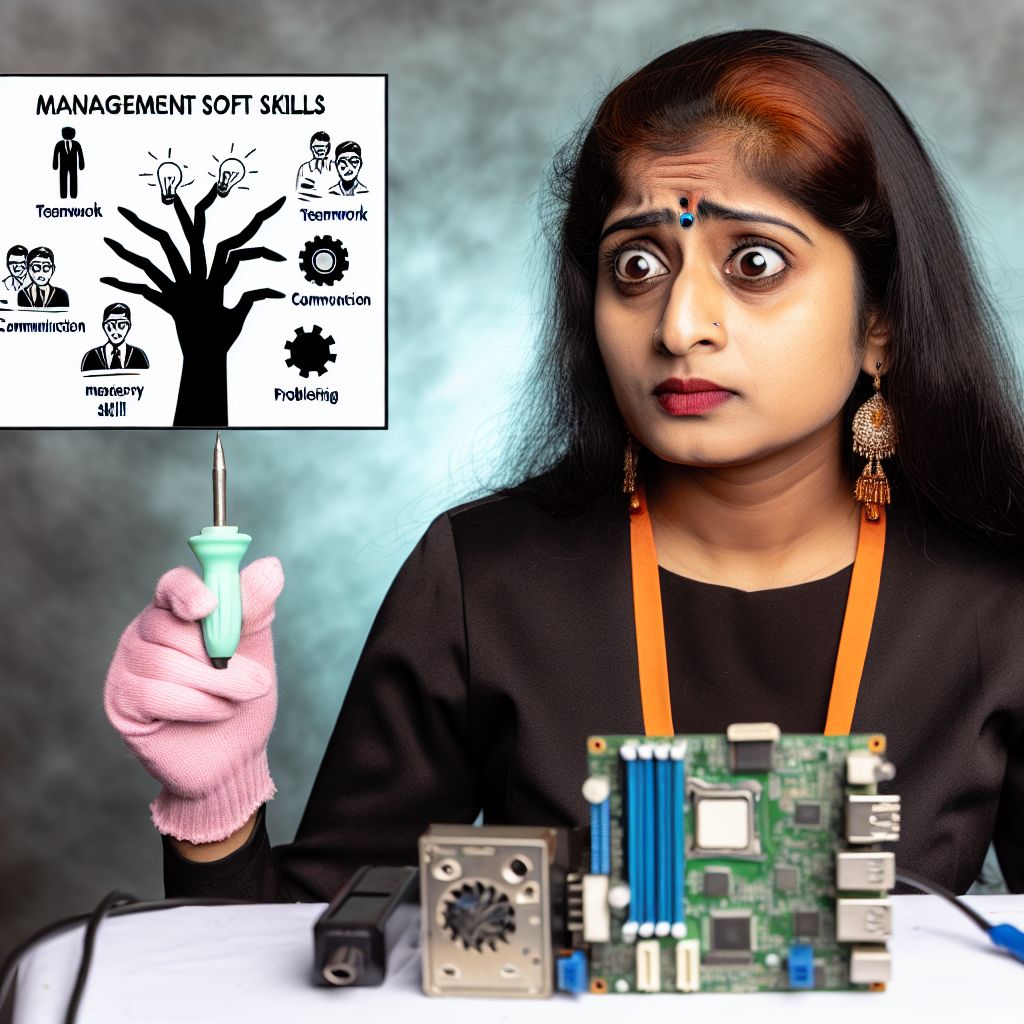Introduction:
Hardware engineering involves designing and building physical components of computer systems.
Critical soft skills like communication, problem-solving, and teamwork are essential in this field.
This blog post will explore the importance of developing these soft skills for hardware engineers.
Technical Communication Skills:
Communication is a core aspect of successful hardware engineering projects.
It plays a critical role in ensuring that the project progresses smoothly.
Importance of clear and concise communication in hardware engineering projects:
- Clear communication helps in setting project expectations and goals.
- Concise communication ensures that all team members understand their roles and responsibilities.
- Effective communication fosters a collaborative work environment and enhances productivity.
Effective communication with team members, clients, and stakeholders:
- Regular team meetings to discuss project updates and challenges.
- Open-door policy to encourage team members to share their thoughts and ideas.
- Timely communication with clients and stakeholders to manage expectations.
Ways to improve technical writing and verbal communication skills:
- Attend workshops or training sessions on technical writing and communication.
- Practice writing technical documents such as project proposals and reports.
- Seek feedback from peers and mentors to improve communication skills.
- Take public speaking courses to enhance verbal communication abilities.
By honing your technical communication skills, you can become a more effective hardware engineer.
You can contribute significantly to the success of your projects.
Problem-Solving Skills
Being able to solve complex hardware problems is a crucial skill for hardware engineers.
Hardware engineering involves working with intricate systems and components, where issues can arise that require a systematic approach to troubleshooting and finding solutions.
- Ability to analyze complex hardware problems and find effective solutions.
- Importance of critical thinking and logical reasoning in hardware engineering.
- Strategies for developing problem-solving skills through practice and experience.
Hardware engineers must have the ability to dissect complex issues, identify the root cause of the problem, and come up with practical solutions to resolve them.
Critical thinking skills are essential in hardware engineering as they enable engineers to evaluate situations, analyze information, and make informed decisions based on logical reasoning.
Problem-solving skills can be honed through practice and hands-on experience. Engineers can improve their problem-solving abilities by working on challenging projects, collaborating with colleagues, and seeking mentorship from experienced professionals.
Additionally, staying updated with the latest technological advancements and trends in hardware engineering can also enhance problem-solving skills by providing engineers with new perspectives and approaches to tackle complex issues.
Problem-solving skills are indispensable for hardware engineers. Developing these skills through practice, experience, and continuous learning is essential for success in the field of hardware engineering.
Uncover the Details: The Role of AI Specialists in Autonomous Vehicles
Collaboration and Teamwork:
When it comes to hardware engineering, collaboration and teamwork are essential for success.
Working effectively in a team environment can lead to innovative solutions and efficient project completion.
Building strong relationships with colleagues is crucial in fostering a positive work environment and achieving common goals.
By utilizing techniques for improving collaboration skills, such as active listening and conflict resolution, hardware engineers can enhance their ability to work effectively in teams.
Working effectively in a team environment in hardware engineering projects
Effective teamwork is crucial in hardware engineering projects, as they often involve complex tasks that require input from multiple individuals.
Transform Your Career Today
Unlock a personalized career strategy that drives real results. Get tailored advice and a roadmap designed just for you.
Start NowBy working together, team members can leverage each other’s strengths and expertise to overcome challenges and achieve project objectives.
Collaborating with colleagues allows hardware engineers to share ideas, troubleshoot problems, and divide tasks efficiently to meet project deadlines.
Effective communication and coordination are key components of successful teamwork in hardware engineering projects.
Building strong relationships with colleagues and working towards common goals
Building strong relationships with colleagues is essential for creating a positive work environment in hardware engineering.
By fostering trust and respect among team members, hardware engineers can enhance collaboration and productivity.
Working towards common goals encourages team members to align their efforts and stay focused on achieving project objectives.
By sharing a sense of purpose and commitment, colleagues can develop a unified approach to problem-solving and decision-making in hardware engineering projects.
Techniques for improving collaboration skills, such as active listening and conflict resolution
Improving collaboration skills is vital for hardware engineers to work effectively in teams.
Active listening involves fully engaging with colleagues, understanding their perspectives, and responding thoughtfully.
By practicing active listening, hardware engineers can show respect for others’ ideas and build stronger relationships with team members.
Conflict resolution skills are also essential for resolving disagreements and maintaining positive working relationships.
By addressing conflicts proactively and seeking mutually beneficial solutions, hardware engineers can foster a harmonious team environment and enhance project outcomes.
Discover More: Best Online Courses for Information Security Analysts
Adaptability and Flexibility in Hardware Engineering
As a hardware engineer, one of the critical soft skills to develop is adaptability and flexibility.
In the constantly evolving field of technology, it is essential to be able to navigate changing hardware specifications and emerging technologies.
Dealing with Changing Technology and Hardware Specifications
Hardware engineering is a field that is characterized by rapid advancements and innovations.
New technologies are constantly being developed, and hardware specifications are frequently updated.
A hardware engineer must stay abreast of these changes to remain competitive and relevant in the industry.
Ability to Quickly Adapt to New Information and Requirements
Adaptability is crucial in hardware engineering as new information and requirements can arise unexpectedly.
Whether it’s a change in project scope or a sudden shift in technology trends, a hardware engineer must be able to quickly adjust their approach and mindset.
Transform Your Career Today
Unlock a personalized career strategy that drives real results. Get tailored advice and a roadmap designed just for you.
Start NowWays to Develop Flexibility Through Project Management and Multitasking
- Utilize project management tools: Project management software can help streamline tasks, track progress, and facilitate communication among team members.
- Embrace multitasking: Hardware engineers often work on multiple projects simultaneously. Being able to juggle various tasks efficiently is a valuable skill in this field.
- Seek feedback and adapt: Soliciting feedback from colleagues and stakeholders can provide valuable insights for improvement. Use this feedback to adapt and refine your approaches.
- Stay updated with industry trends: Attend conferences, workshops, and webinars to stay informed about the latest developments in hardware engineering. This proactive approach will help you anticipate changes and adapt accordingly.
- Practice problem-solving: Engage in challenging projects that require creative problem-solving skills. This will help sharpen your adaptability and flexibility in tackling unforeseen obstacles.
By honing your adaptability and flexibility skills, you’ll be better equipped to navigate the dynamic landscape of hardware engineering.
Embrace change as an opportunity for growth and innovation, and you’ll thrive in this fast-paced and exciting field.
Delve into the Subject: How to Use Threat Intelligence as an Analyst
Attention to Detail:
Attention to detail is a crucial soft skill in hardware engineering.
Even the smallest mistake can lead to significant issues in design and development.
Achieving precision and accuracy in hardware engineering designs and prototypes is essential for the success of any project.
It is imperative to pay close attention to the details of your work to ensure that everything runs smoothly and efficiently.
One of the main reasons why attention to detail is so important in hardware engineering is to avoid costly mistakes.
A simple error in a design can lead to delays in production, increased expenses, and even potential safety hazards.
By focusing on the details and refining your work, you can prevent these issues from occurring.
Here are some tips for improving your attention to detail in hardware engineering:
- Double-check your work:
Before finalizing any design or prototype, take the time to review it carefully. Look for any discrepancies, errors, or inconsistencies that may have been overlooked initially. By double-checking your work, you can catch potential mistakes early on and correct them before they become larger issues. - Stay organized:
Keeping your workspace organized and clutter-free can help you maintain focus and concentration on the task at hand. Create a system for storing and organizing your tools, components, and materials so that you can easily access them when needed. A well-organized workspace can also help streamline your workflow and improve productivity. - Use checklists:
Creating a checklist of tasks and requirements for each project can help you stay on track and ensure that you don’t miss any important details. Checklists can serve as a roadmap for your work, guiding you through each step of the design and development process. They can also help you prioritize tasks and allocate your time and resources effectively. - Practice mindfulness:
Being present and fully engaged in your work can improve your attention to detail. Practice mindfulness techniques, such as deep breathing exercises or meditation, to help you focus on the task at hand and block out distractions. By cultivating a sense of awareness and concentration, you can enhance your ability to notice and address details that may otherwise go unnoticed.
Overall, attention to detail is a critical soft skill that can make a significant difference in the success of your hardware engineering projects.
By prioritizing precision and accuracy, avoiding costly mistakes, and implementing strategies to improve your attention to detail, you can enhance the quality and efficiency of your work in hardware engineering.
Remember, the devil is in the details, so make sure to pay close attention to them!
Find Out More: Trends in Cybersecurity Education and Training

Time Management:
Time management is a critical soft skill for hardware engineers.
They often work on multiple projects simultaneously.
Juggling these projects while meeting tight deadlines requires effective time management strategies.
One key aspect of time management in hardware engineering is setting priorities.
Engineers must determine which tasks are most important and focus their time and energy accordingly.
Transform Your Career Today
Unlock a personalized career strategy that drives real results. Get tailored advice and a roadmap designed just for you.
Start NowBy prioritizing tasks, they can ensure that critical project goals are met on time.
To improve time management skills, hardware engineers can utilize various techniques.
One effective method is to create a detailed schedule outlining daily tasks and deadlines.
This allows engineers to allocate time wisely and ensure that all tasks are completed on time.
Breaking down tasks into smaller steps is another effective time management technique.
By dividing large projects into smaller, more manageable tasks, engineers can progress steadily towards their goals.
This approach also helps in tracking progress and staying on schedule.
Managing time effectively also involves avoiding distractions and maintaining focus.
Engineers should eliminate unnecessary interruptions and dedicate specific time blocks to each task.
This helps in staying organized and completing tasks efficiently.
Additionally, effective communication plays a crucial role in time management.
Engineers should communicate clearly with team members and clients to ensure everyone is on the same page.
This reduces misunderstandings and helps in meeting project deadlines effectively.
Overall, developing strong time management skills is essential for hardware engineers to succeed in their roles.
By juggling multiple projects, setting priorities, and utilizing effective techniques, engineers can meet project goals efficiently.
They can deliver high-quality results.
- Juggling multiple projects and deadlines in hardware engineering
- Setting priorities and managing time effectively to meet project goals
- Techniques for improving time management skills, such as creating a schedule and breaking down tasks into smaller steps
Creativity and Innovation:
Thinking outside the box to create innovative hardware solutions.
Importance of creativity in designing new products and improving existing ones.
Ways to nurture creativity, such as brainstorming sessions and exploring new technologies.
Creativity and innovation are essential soft skills in hardware engineering.
Transform Your Career Today
Unlock a personalized career strategy that drives real results. Get tailored advice and a roadmap designed just for you.
Start NowIt involves thinking creatively to come up with unique and groundbreaking hardware solutions.
Thinking outside the box to create innovative hardware solutions:
In hardware engineering, being able to think outside the box is crucial.
It means approaching problems in new and unconventional ways to find innovative solutions.
Creative thinking can lead to the development of new technologies, processes, and products that can revolutionize the industry.
Importance of creativity in designing new products and improving existing ones:
Creativity is key to designing new products that meet the ever-evolving needs of consumers.
It allows engineers to come up with fresh ideas that can set a product apart from the competition.
When it comes to improving existing products, creativity enables engineers to find innovative ways to enhance performance, functionality, and user experience.
Ways to nurture creativity, such as brainstorming sessions and exploring new technologies:
Brainstorming sessions are a great way to spark creativity among hardware engineers.
It allows team members to bounce ideas off each other and come up with innovative solutions collaboratively.
Exploring new technologies is another way to nurture creativity in hardware engineering.
By staying up-to-date with the latest advancements, engineers can find inspiration for new solutions and designs.
Developing Communication Skills
Effective communication is crucial in hardware engineering.
It involves collaborating with cross-functional teams.
Enhancing Problem-Solving Skills
Problem-solving is at the core of hardware engineering.
Developing this skill involves critical thinking and creativity.
Building Time Management Skills
Time management is essential to meet project deadlines in hardware engineering.
Prioritizing tasks and managing time effectively is key.
Developing Teamwork Skills
Collaboration is fundamental in hardware engineering projects.
Building strong teamwork skills leads to successful project outcomes.
Improving Adaptability Skills
Hardware engineers often face unexpected challenges.
Transform Your Career Today
Unlock a personalized career strategy that drives real results. Get tailored advice and a roadmap designed just for you.
Start NowBeing adaptable enables engineers to navigate changes effectively.
Strengthening Attention to Detail
In hardware engineering, precision is critical.
Attention to detail ensures that designs are accurate and functional.
Enhancing Leadership Skills
Strong leadership skills are valuable in hardware engineering.
Leading a team effectively can drive project success.
Emphasizing Continuous Learning
Hardware engineering is a constantly evolving field.
Embracing a growth mindset and continuous learning is crucial for success.
Additional Resources
Why Communication is a Critical Skill for Engineers | American …
Computer and Information Research Scientists : Occupational …




